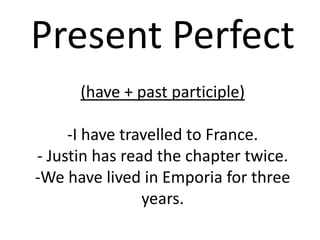
Present Perfect or Simple Past
- 1. Present Perfect(have + past participle)-I have travelled to France.- Justin has read the chapter twice.-We have lived in Emporia for three years.
- 2. Why do we use the Present Perfect? Related to NOW -Before NOW -Including NOW (Still) - Up to NOW
- 6. HOMEWORK Find two newspaper articles with examples of the present perfect. (You may need to read a few articles to find an article with many examples of the present perfect.) Bring the articles to class.
- 7. HOMEWORK Go to a restaurant, hotel, book store, or any other business. Ask the workers or owner for a job application. Bring the application to class tomorrow.
- 8. has just discovered cancelled has already made just returned opened Read told has done complained put hasn’t changed Workbook Exercise 3
- 9. Book Exercise 4 just found out / has just found out has won / won has bought has never won / never won won has changed has gotten have been / were won has thought about